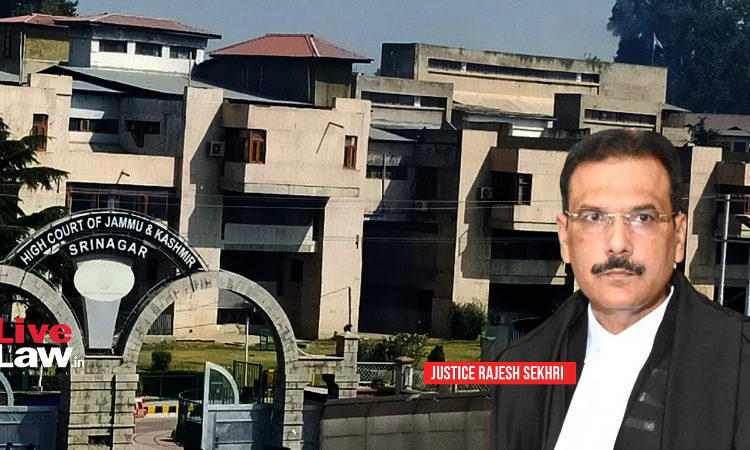- Home
- /
- High Courts
- /
- High Court of J & K and Ladakh
- /
- Statutory Presumption Under NI Act...
Statutory Presumption Under NI Act Falls If Complainant Fails To Prove Financial Capacity: J&K High Court
LIVELAW NEWS NETWORK
10 Jun 2025 6:35 PM IST
Reaffirming the importance of financial credibility in cheque bounce litigation, the High Court of Jammu and Kashmir and Ladakh has ruled that failure of the complainant to prove financial capacity to extend a large loan can fatally weaken the case, particularly when the accused manages to raise a plausible defence.Justice Rajesh Sekhri, while dismissing a criminal appeal observed that once...
Reaffirming the importance of financial credibility in cheque bounce litigation, the High Court of Jammu and Kashmir and Ladakh has ruled that failure of the complainant to prove financial capacity to extend a large loan can fatally weaken the case, particularly when the accused manages to raise a plausible defence.
Justice Rajesh Sekhri, while dismissing a criminal appeal observed that once doubt is cast on the financial ability of the complainant, the presumptions under Sections 118 and 139 of the Negotiable Instruments Act, 1881, stand rebutted.
The observation came in a criminal appeal filed by one Jagdish Raj Gupta, challenging the acquittal of the respondent Parshotam Gupta by the Special Railway Magistrate, Sub-Judge Jammu, in a complaint under Section 138 of the NI Act.
The genesis of the case lay in the claim made by the appellant that the respondent had borrowed ₹20 lakhs from him, and in discharge of the said debt, issued a cheque drawn on the Citizens Cooperative Bank Ltd., Jammu. The cheque, upon presentation, was dishonoured with the remark "Funds Insufficient." A statutory demand notice was served on the respondent and upon non-payment, a complaint under Section 138 was filed.
The respondent, though admitting the issuance and signing of the cheque, contested the complaint by stating that the cheque was not issued in discharge of a loan but rather in connection with a land transaction that ultimately failed. He also denied receipt of the demand notice and took a consistent stand throughout the trial. He produced defence witnesses to support his claim and asserted that another cheque of ₹5 lakhs had already been encashed by the appellant and ₹3.5 lakhs paid in cash, all as part of the said deal.
Justice Sekhri observed that while the presumption under Sections 118 and 139 is certainly in favour of the complainant upon admission of cheque issuance, the law equally allows the accused to rebut the presumption by showing a plausible defence.
Citing judgments of the Supreme Court in Kumar Exports v. Sharma Carpets, Basalingappa v. Mudibasappa, and Rangappa v. Sri Mohan, the Court emphasized that the accused is not required to prove his defence beyond reasonable doubt, but only to the extent of preponderance of probabilities.
The Court critically examined the appellant's evidence. It noted that nowhere in the complaint or initial statement had the complainant disclosed the date of advancing ₹20 lakhs, nor was he able to substantiate the transaction with any documentary proof or testimony of witnesses.
The court noted that although he initially claimed that the money was given in presence of his brothers and a friend, he failed to examine any of them during trial. “The appellant complainant in his initial statement in the trial Court, stated in cross examination that he had given a cash of Rs.20.00 lacs to the accused at his home in the presence of his brothers, Joginder Lal and Rajinder Kumar and his friend, Romesh Verma. However, he failed to examine anyone of them during the trial”, the court remarked.
Justice Sekhri held that such material contradictions in the complainant's own narrative, coupled with the inability to establish his financial capacity, gravely undermined the case. The Court noted that the appellant ran a ration depot with an income of ₹15,000–₹20,000 per month, and failed to produce any income tax returns despite claiming to be an income tax payee.
The High Court agreed with the trial court's findings that a person with such modest means could not have extended an unsecured cash loan of ₹20 lakhs, especially in the absence of any supporting evidence like loan agreements, bank statements, or credible testimony. The Court found the defence version more probable, particularly since the accused had not only taken a consistent stand but had also produced witnesses to support the existence of a failed land deal.
The Court also dismissed the appellant's argument that non-joinder of the firm (to which the cheque was allegedly issued) rendered the complaint defective. It held that since the respondent was the sole proprietor of the firm, there was no need to implead the firm separately.
In conclusion, Justice Rajesh Sekhri reaffirmed that the accused had successfully rebutted the statutory presumptions under Sections 118 and 139 of the NI Act by demonstrating a plausible and consistent defence, while the complainant had failed to establish the existence of any legally enforceable debt or liability.
The appeal was accordingly dismissed.
Case Title: Jagdish Raj Gupta Vs Purushottam Gupta
Citation: 2025 LiveLaw (JKL) 227



